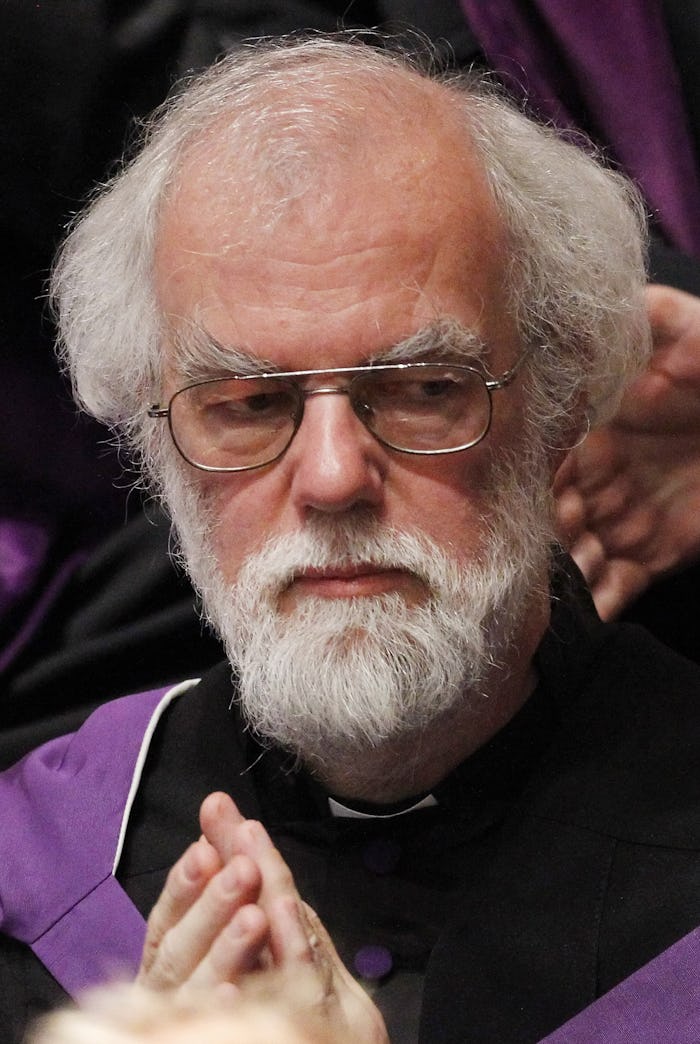News

The Priest Marrying Meghan & Harry's Wedding May Look Different Than The Man That Married Kate & Will
The moment everyone has been waiting for since Prince Harry first announced his engagement to American actress Meghan Markle is finally here. Meghan has taken her walk down the aisle of St George's Chapel in Windsor, England and was delivered to the hands of her beloved by her future father-in-law Prince Charles. Before them stands a stately priest robed in the way allowed only to the Archbishop of Canterbury, ready to solemnize their vows. However, you may notice he looks different. Did the same priest officiate William and Kate's wedding, or is this a new Archbishop?
Your eyes do not deceive you. The Archbishop officiating the nuptials between Prince Harry and Meghan Markle is indeed different from the Archbishop who presided over the wedding of Prince William, Duke of Cambridge and Catherine, now Duchess of Cambridge. That priest was (takes breath before reading exceptionally long title) The Most Reverend and Right Honourable, the Lord Archbishop of Canterbury, Doctor Rowan Williams. The Archbishop you see before you today is Archbishop Justin Wembly.
Dr. Williams stepped down from the position as the 104th Archbishop of Canterbury after serving more than 20 years as a Bishop and Archbishop in the church, before deciding to take a position at Magdalene College, noted the BBC.
The way the position is designed, according to church tradition, is for a bishop to be elevated into the service as Archbishop for an extended period of time, for as long as they feel they are assisting the Church in its mission. It's unlike the Catholic Church in that their chief priest, the Pope, was always meant to be a lifetime appointment up until his Excellency Pope Benedict stepped down several years ago, allowing His Eminence Pope Francis to step into the role. The Archbishop of Canterbury is the second highest ranking member of the church, behind the current ruling monarch. In this era, that's Her Majesty Queen Elizabeth II.
Dr. Williams was known for being one of the keenest minds in the kingdom, and also one of the most progressive. During his tenure he was often lauded by the left for his positions on female and gay clergy that sometimes put him at odds with the more conservative members of government, noted The Guardian. On the flip side of that coin, Williams also drew criticism on the left for failing to go far enough when it came to liberal viewpoints he discussed in talks or writings, and when he was ultimately unable to achieve legal same-sex marriages within the church.
He's also — get this — a poet. Now the Welsh have always had their bards, like Dylan Thomas and Henry Vaughn, but Williams' poetry is unique not only in that he's a former Archbishop, but in that the subject matter is not always what one would expect such a distinguished man of the cloth to pen. He told The Guardian, "Poetry happens at a sort of junction in the mind when new combinations start up, words and pictures start connecting in unexpected ways." Sure, he writes about Gethsemane and the time of Advent, but he writes about the banal — about love, birth, and renewal.
I mean, if I was single and he was 35 years younger and perhaps lacked the swirly eyebrows that remind me of my grandfather, I'd totally swoon.
From "Crossings", he writes, "What prudence keeps me in this glassy cell, The polished atoms of half-willed defeats? Well, atoms split, my love, are lovers’ death, Out in the cold, no wind will lend us breath."
Thankfully, Archbishop Welby is no slouch when it comes to delivering a homily as we're about to witness, but there was something special about the grace of Dr. Williams' words.